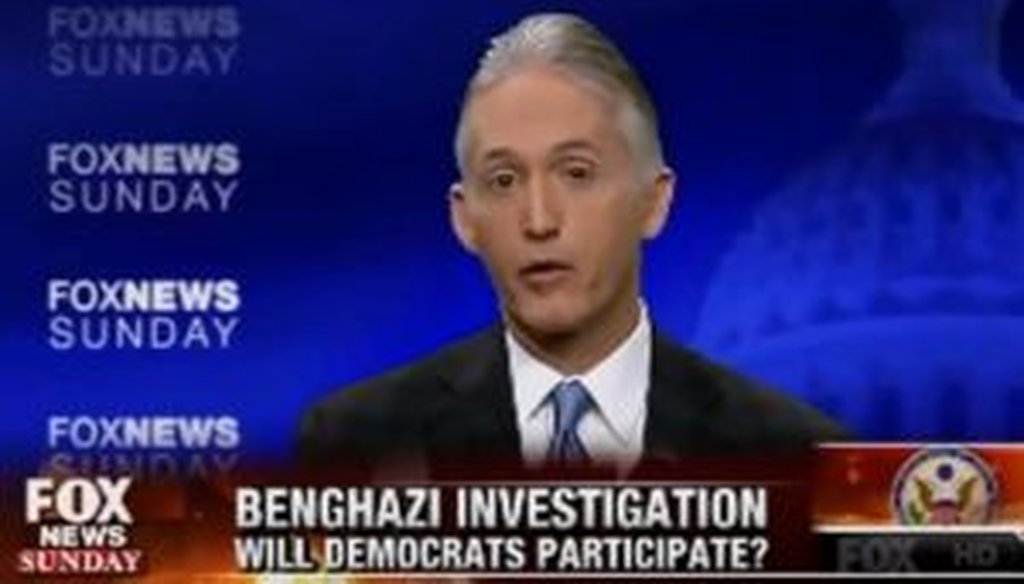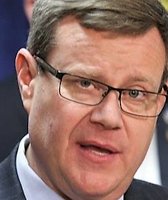Stand up for the facts!
Our only agenda is to publish the truth so you can be an informed participant in democracy.
We need your help.
I would like to contribute

Rep. Trey Gowdy, R-S.C., discussed the new Benghazi committee he'll be heading during an appearance on "Fox News Sunday."
This report was originally published May 9, 2014, and has been updated with additional fact-checks.
House Republicans want another investigation of the attacks in Benghazi, specifically whether the White House is withholding information on the attacks.
By some counts, it’s the eighth investigation into the Sept. 11, 2012, attacks in Libya in which four Americans died, including the U.S. ambassador.
The vote to create a new select committee succeeded largely on a party-line vote, 232-186.
PolitiFact has been monitoring claims about the attacks since shortly after they occurred. The rhetoric has been highly politicized, focusing on whether the Obama administration downplayed the role of terrorists in the attacks.
Sign up for PolitiFact texts
What happened at Benghazi
Not up to speed on what happened in Benghazi? Here’s a history: Diplomatic workers staffed a temporary residential outpost in the Libyan city after the death of dictator Moammar Gadhafi. On a night the U.S. ambassador, Christopher Stevens, was visiting from the capital in Tripoli, armed Islamic terrorists attacked, setting a toxic diesel-fueled fire that killed the ambassador and a colleague. Americans then drove, chased by attackers, to a nearby annex, where a mortar attack in the morning killed two security contractors. By noon, hasty scrambling by the American and Libyan governments got U.S. workers to safety in Tripoli, along with their four dead comrades.
That "annex" was a compound used by the CIA. So, while we’ve seen unclassified reports from a State Department accountability review board, a Senate committee and some House Republicans, and watched testimony before Rep. Darrell Issa’s House committee — there’s a layer of secrecy that daunts diplomats and lawmakers alike.
Obama’s reaction
Our first check on Benghazi was from a 2012 presidential debate, when Republican nominee Mitt Romney said it took President Barack Obama "14 days before he called the attack in Benghazi an act of terror."
Actually, Obama described it in those terms the day after the attack. But in the days that followed, neither he nor all the members of his administration spoke consistently on the subject. There were many suggestions that the attack was part of demonstrations over an American-made video that disparaged Islam. We rated Romney’s statement Half True.
Was there a chance to act that the White House didn’t take?
Other claims we’ve fact-checked focused on what happened the night of the attacks and afterward. Some have suggested that the administration could have acted to prevent the attacks and didn’t, but the claims we looked at were just wrong and didn’t match up with actual events.
Rep. Jason Chaffetz, R-Utah, suggested in May 2013 that the United States could have prevented the deaths with military action. Here’s what he told Sean Hannity on Fox News:
"The administration including (Defense) Secretary (Leon) Panetta were very crystal clear, there were no military assets, but I got to tell you, we had proximity, we had capability, we had four individuals in Libya armed, ready to go, dressed about to get into the car to go in the airport to go help their fellow countrymen who were dying and being killed and under attack in Benghazi and they were told to stand down."
By all accounts, though, this description doesn’t match the timeline of what happened in Benghazi. The four people in Benghazi were already dead when the decision was made to keep the special forces team in Tripoli. (We outline this in more detail in our fact-check.) The mortar attack was over. We rated this statement False.
Also last year, Texas Lt. Gov. David Dewhurst said President Obama should be impeached; one reason he gave was that the White House watched live video of the attacks while it was occurring. "I’m very concerned about Benghazi, in which all of the national news reporting indicated that live video was streaming into the White House," Dewhurst told a reporter.
Actually, there’s no evidence that there was live video. Administration officials have said repeatedly that there wasn’t, and government workers have put a lot of effort into looking for video that may have been captured on the ground in Libya. Other fact-checkers and journalists have debunked this claim as well. PolitiFact Texas rated Dewhurst’s statement Pants on Fire.
Was the United States "the last flag flying" in Benghazi when the attacks happened?
Rep. Trey Gowdy, R-S.C., is the House member tapped by House Speaker John Boehner, R-Ohio, to head the newly established House Select Committee on Benghazi. In an interview on Fox News Sunday, Gowdy said he wanted to ask former Secretary of State Hillary Clinton this: "Why were we still in Benghazi? The British ambassador was almost assassinated. Our facility was attacked twice. There were multiple episodes of violence. We were the last flag flying in Benghazi, and I would like to know why."
We looked into whether the United was the "last flag flying in Benghazi" and found clear evidence that several other western nations had a presence in Benghazi immediately before and well after the attack on the U.S. compound. We rated his statement False.
Was the ambassador’s body abused?
There also have been assertions that the ambassador’s body was abused as part of the attacks, but evidence doesn’t support that.
A chain email a reader sent us last year bizarrely claimed that Dee Dee Myers, the former press secretary to Bill Clinton, had a cousin in Benghazi on the night of the attacks who said Stevens’ body was "dragged through the streets" and abused. When we asked Myers about it, she said she didn’t have a cousin there and knew nothing about the email. We rated the claim Pants on Fire.
More recently, conservative pundit Laura Ingraham said this on ABC News’ This Week: "The ambassador's body was dragged through the street. Okay? It was beyond heartbreaking and beyond infuriating."
Three government reports and independent press accounts contradict that. Stevens was overcome by smoke from the fire, and Libyans brought him to a hospital where efforts to revive him failed. There are no credible reports of public abuse of his body. We rated her statement False.
Did budget cuts from Congress play a role in the lack of security?
MSNBC's Ronan Farrow pointed to unfulfilled spending requests for embassy security funding and put the responsibility on Democrats and Republicans in Congress. "It’s easy to gain political plaudits by saying ‘spend less around the world,’ and then it leads up to these tragedies," he said.
While it's true that Congress did not fully fund embassy security requests from the Obama administration in recent years, funding for embassy security is actually up from 2008, and up dramatically since before 9/11.
How does this tie into the Benghazi attack? State Department officials and government experts lay more blame on decisions by upper management not to provide the temporary Benghazi facility with more officers and better protections than on the availability of money. We rated Farrow's claim Mostly False.
Did Hillary Clinton know that more security was needed?
On the issue of security at the outpost in Benghazi, U.S. Sen. Rand Paul put the blame on Hillary Clinton.:
"I think it's pretty important that she accept blame for not providing security," Paul said. "She was asked repeatedly to provide security in Benghazi on several occasions including direct cables, and she says she never read the cables on security. I find that inexcusable and a dereliction of duty."
The State Department was asked repeatedly for additional U.S. security staff in Libya. But we see no evidence that Clinton herself was made aware of those requests. For example, there’s no "direct cable" that automatically appears on the secretary of state’s desk. Instead, all cables would have carried her name, and only those passed up the chain by staff would have reached her. She says they didn’t. Paul’s office didn’t provide evidence linking requests for security directly to Clinton. We found only evidence that requests were made of her department. We rate his statement Mostly False.
Did Rice downplay terrorism?
Last year, Obama said that the facts behind the attacks had been thoroughly investigated by an independent review board, but he exaggerated how wide-ranging the review was.
"Over the last several months, there was a review board headed by two distinguished Americans, Mike Mullen and Tom Pickering, who investigated every element of" the Benghazi incident, he said.
We found that the review board did not look at every element of the incident. It looked at most of the security matters involved, but it didn't look at who conducted the attacks or at the administration's public comments in the days following. We rated Obama's statement Mostly False.
Meanwhile, we also found accuracy problems with claims about what Susan Rice -- then the Ambassador to the United Nations, now Obama’s National Security Adviser -- said on the Sunday talk shows in the immediate aftermath of the attacks. Rice’s appearances were widely perceived as playing down the role of terrorists in the attacks.
In the more than 19 months since then, we’ve found a couple of claims that tried to gloss over Rice’s words.
Pundit Cokie Roberts on ABC’s This Week said: "When you read the transcript of those Sunday shows, actually Ms. Rice did say a ‘terrorist attack.’ It’s not that she put the whole thing on the video."
Our review of the transcripts from Rice’s appearances showed the opposite. She consistently emphasized the importance of the video, and the only times she brought up the possibility of a terrorist connection was to downplay it. We rated Roberts’ claim Mostly False.
Similarly, back in May 2013, White House Press Secretary Jay Carney said that when Rice spoke about Benghazi on the shows, she said "that al-Qaida might be involved, or other al-Qaida affiliates might be involved, or non-al-Qaida Libyan extremists, which I think demonstrates that there was no effort to play that down."
It’s true that Rice offered those three scenarios, but Carney is wrong to say she didn’t play them down. Rice said that the extremists didn’t pre-plan the attack, but instead hijacked a demonstration that was already under way. She barely mentioned the potential role of al-Qaida or one of its affiliates, and she urged caution about jumping to conclusions on the one occasion in which she did. We rated Carney’s claim Mostly False.
How did the media cover Benghazi?
We’ve also fact-checked claims about the media and how Benghazi has or hasn’t been portrayed.
Fox News host Bill O’Reilly, for example, denied accusing the White House of political motives in its early Benghazi response after Obama said he did. This exchange happened during an interview on Super Bowl Sunday in 2014:
O'Reilly: "Your detractors believe that you did not tell the world it was a terror attack because your campaign didn't want that out."
Obama: "Bill, think about..."
O'Reilly: "That's what they believe."
Obama: "-- and they believe it because folks like you are telling them that."
O'Reilly: "No, I'm not telling them that."
Actually, O’Reilly consistently told viewers that someone was trying to mislead the American public. He repeatedly compared the situation to the impeachments of Richard Nixon and Bill Clinton. We rated his denial Mostly False.
Republican strategist Karl Rove, meanwhile, complained there was less coverage of Benghazi than to a scandal about a closed bridge in New Jersey connected to Gov. Chris Christie. The amount of attention paid to Christie makes the coverage of Benghazi "pale in significance," Rove said. We reviewed media coverage of Benghazi and Christie’s bridge problems, looking at it both in number and quality. We concluded the Benghazi coverage was more extensive. We rated Rove’s statement False.
Democrats, meanwhile, have charged that Republicans doctored emails in their efforts to continue attacking the White House on Benghazi.
"Republicans actually doctored emails between administration officials about Benghazi. Then, they released them to the press, trying to pass them off as real," the Democratic National Committee said in an email to its reporters.
When we asked, Democrats didn’t provide evidence that discrepancies about the emails resulted from anything more than sloppy note-taking, or that journalists had been snookered into believing they had seen the original messages. Their claim about doctoring evidence could use some evidence. We rated the claim Mostly False.
Our Sources
See individual factchecks for sources.





















































